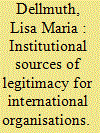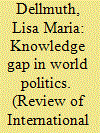|
|
|
Sort Order |
|
|
|
Items / Page
|
|
|
|
|
|
|
| Srl | Item |
| 1 |
ID:
168868


|
|
|
|
|
| Summary/Abstract |
This article addresses a significant gap in the literature on legitimacy in global governance, exploring whether, in what ways, and to what extent institutional qualities of international organisations (IOs) matter for popular legitimacy beliefs towards these bodies. The study assesses the causal significance of procedure and performance as sources of legitimacy, unpacks these dimensions into specific institutional qualities, and offers a comparative analysis across IOs in three issue areas of global governance. Theoretically, the article disaggregates institutional sources of legitimacy to consider democratic, technocratic, and fair qualities of procedure and performance. Empirically, it examines the effects of these institutional qualities through a population-based survey experiment in four countries in different world regions with respect to IOs in economic, security, and climate governance. The findings demonstrate that both procedure- and performance-related aspects of IO policymaking matter for popular legitimacy beliefs. This result holds across democratic, technocratic, and fair qualities of IO procedure and performance. Disaggregating the results by issue area indicates that a broader scope of institutional qualities are important for legitimacy beliefs in economic governance compared to security governance and, especially, climate governance. These findings suggest that propositions to reduce the institutional sources of IO legitimacy to single specific qualities would be misguided.
|
|
|
|
|
|
|
|
|
|
|
|
|
|
|
|
| 2 |
ID:
148128


|
|
|
|
|
| Summary/Abstract |
The past decades have seen a significant expansion in the scope and authority of international organisations (IOs), raising questions about who participates and is represented in the public contestation of IOs. An important precondition for citizens to become critically involved in the public debate about an IO is that they are aware of the politics of that IO. This article sheds light on this largely unexplored issue, asking why some citizens are more aware of IOs than others. This question is examined in the context of a powerful international organisation, the United Nations Security Council. Using a multilevel analysis of citizens in 17 Asian and European countries, this article argues that citizen knowledge about the Council is shaped by economic conditions and cosmopolitan identity. Higher levels of knowledge are found among the wealthier, and there is some evidence that income inequality depresses knowledge among poorer citizens. Furthermore, citizens identifying with groups or individuals across nation-state borders are more likely to know more about the Council. The article sketches broader implications for the study of the politicisation of IOs and citizen representation in the public contestation of IOs.
|
|
|
|
|
|
|
|
|
|
|
|
|
|
|
|
| 3 |
ID:
148129


|
|
|
| 4 |
ID:
139586


|
|
|
|
|
| Summary/Abstract |
Social legitimacy is central to the effectiveness of international organisations (IOs). Yet, so far, we have little systematic knowledge about what drives citizens to support or oppose IOs. In this article, we isolate and assess three alternative explanations of social legitimacy in global governance, privileging interest representation, institutional performance, and confidence extrapolation. We test these theories in a multilevel analysis of citizen confidence in the United Nations (UN) using World Values Survey and European Values Study data, supplemented by contextual measures. The results grant support to the arguments that institutional performance and confidence extrapolation shape popular confidence in the UN, while offering little support for the explanation of interest representation. These findings challenge the predominant understanding that more democratic procedures lead to greater social legitimacy for IOs. Instead, the UN case suggests that the social legitimacy of IOs is based primarily on the organisations' capacity to deliver, as well as on citizens' general confidence in political institutions, which IOs may have little to do with and can do little to change.
|
|
|
|
|
|
|
|
|
|
|
|
|
|
|
|
|
|
|
|
|